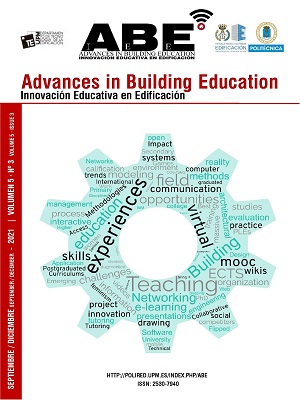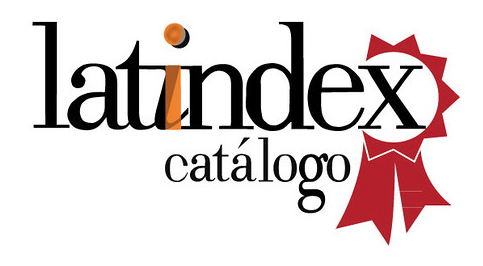Strategies and challenges for the promotion of a responsibility mindset in technical career students during internships
DOI:
https://doi.org/10.20868/abe.2021.3.4735Resumen
Promoting responsibility values and knowledge of students requires actions with a strong focus on citizenship and ethics, with the aim to commit, engage, and empower future professionals. In this sense, a key question arises: how to define and foster responsibility among professionals at different organizational levels? This paper deals with contextual factors and key concepts for promoting responsibility-related values and competences (knowledge, skills, attitudes) throughout curricular internships carried out by students of technical degrees. In this work, we explore the advantages and challenges of working on a responsibility approach at this stage of a professional career, and we outline ideas for optimizing the process.Descargas
Referencias
UNFCCC, «Conference of the Parties (COP) UNFCCC». https://unfccc.int/process/bodies/supreme-bodies/conference-of-the-parties-cop (accessed Mar. 20, 2021).
European Commission, «A European Green Deal», European Commission - European Commission. https://ec.europa.eu/info/strategy/priorities-2019-2024/european-green-deal_en (accessed Mar. 20, 2021).
P. Glavič, Z. N. Pintarič, and M. Bogataj, «Process Design and Sustainable Development—A European Perspective», Processes, vol. 9, n. 1, Art. n. 1, Jan. 2021, doi: 10.3390/pr9010148.
M. Lieder and A. Rashid, «Towards circular economy implementation: a comprehensive review in context of manufacturing industry», J. Clean. Prod., vol. 115, pp. 36-51, Mar. 2016, doi: 10.1016/j.jclepro.2015.12.042.
J. M. Smith, C. J. McClelland, and N. M. Smith, «Petroleum Engineering Students’ Views of Corporate Social Responsibility», presented at 2016 ASEE Annual Conference & Exposition, jun. 2016, Accessed: Mar. 20, 2021. [Online]. Available at: https://peer.asee.org/petroleum-engineering-students-views-of-corporate-social-responsibility.
J. D. Sachs, G. Schmidt-Traub, M. Mazzucato, D. Messner, N. Nakicenovic, and J. Rockström, «Six Transformations to achieve the
Sustainable Development Goals», Nat. Sustain., vol. 2, n. 9, Art. n. 9, Sep. 2019, doi: 10.1038/s41893-019-0352-9.
P. Cane, Responsibility in Law and Morality. Oxford: Hart Publishing, 2002.
R. A. Duff, «Responsibility», in Routledge Encyclopedia of Philosophy, 1st ed., London: Routledge, 2016.
D. Birnbacher, «Philosophical Foundations of Responsibility», in Responsibility: The Many Faces of a Social Phenomenon, A. E. Auhagen and H. W. Bierhoff, Eds. London: Routledge, 2001, pp. 9-22.
S. Baumgärtner, T. Petersen, and J. Schiller, «The Concept of Responsibility: Norms, Actions and Their Consequences», Social Science Research Network, Rochester, NY, SSRN Scholarly Paper ID 3157667, Apr. 2018. doi: 10.2139/ssrn.3157667.
D. Robb, «Moral Responsibility and the Principle of Alternative Possibilities», in The Stanford Encyclopedia of Philosophy, Fall 2020., E. N. Zalta, Ed. Metaphysics Research Lab, Stanford University, 2020.
R. McKeon, «The Development and the Significance of the Concept of Responsibility», Rev. Int. Philos., vol. 11, n. 39 (1), pp. 3-32, 1957.
R. E. Freeman, Strategic management : a stakeholder approach. Boston : Pitman, 1984.
Business Roundtable, «Statement on the Purpose of a Corporation», Business Roundtable - Opportunity Agenda. https://opportunity.businessroundtable.org/ourcommitment (accessed Mar. 19, 2021).
R. Von Schomberg, «Prospects for Technology Assessment in a Framework of Responsible Research and Innovation», in Technikfolgen abschätzen lehren: Bildungspotenziale transdisziplinärer Methoden, M. Dusseldorp and R. Beecroft, Eds. VS Verlag für Sozialwissenschaften, 2011.
H. R. Bowen, Social responsibilities of the businessman. New York: Harper, 1953.
W. C. Frederick, «The Growing Concern over Business Responsibility»:, Calif. Manage. Rev., jul. 1960, doi: 10.2307/41165405.
A. B. Carroll, «A Three-Dimensional Conceptual Model of Corporate Performance», Acad. Manage. Rev., vol. 4, n. 4, pp. 497-505, 1979, doi: 10.2307/257850.
UNDESA, «SDGs. Sustainable Development Knowledge Platform». https://sustainabledevelopment.un.org/sdgs (accessed Apr. 27, 2020).
European Union (EU), «Council Recommendation of 22 May 2018 on key competences for lifelong learning», Off. J. Eur. Union, may 2018, [Online]. Available at: https://eur-lex.europa.eu/legal-content/EN/TXT/?uri=uriserv%3AOJ.C_.2018.189.01.0001.01.ENG&toc=OJ%3AC%3A2018%3A189%3ATOC.
Descargas
Publicado
Número
Sección
Licencia
ABE (Advances in Building Education / Innovación Educativa en la Edificación) no aplica cargo alguno a los autores por procesar o publicar un artículo y provee acceso abierto (Open Access) inmediato a su contenido. Todo el contenido está disponible gratuitamente sin cargo para el usuario o su institución. Se permite a los usuarios leer, descargar, copiar, distribuir, imprimir, buscar o vincular a los textos completos de los artículos, o utilizarlos para cualquier otro propósito lícito, sin pedir permiso previo del editor o el autor. Esto está de acuerdo con la definición de acceso abierto de la BOAI.
1. Los autores conservan los derechos de autor y garantizan a la revista el derecho de una Licencia Creative Commons Atribución / No Comercial / No Derivadas 4.0 Internacional (CC BY NC ND) que permite a otros compartir el trabajo con un reconocimiento de la autoría y uso no comercial.
2. Los autores pueden establecer por separado acuerdos adicionales para la distribución no exclusiva de la versión de la obra publicada en la revista (por ejemplo, situarlo en un repositorio institucional o publicarlo en un libro).
Salvo indicación contraria, todos los contenidos de la edición electrónica se distribuyen bajo una licencia de uso y distribución “Creative Commons".














